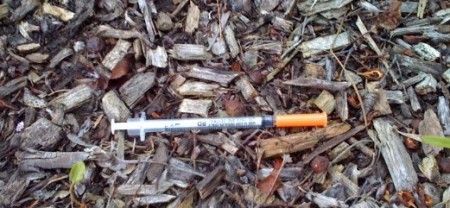Volunteers search for bright spots amid the needles
Published 3:00 pm Friday, April 10, 2015
INDIANAPOLIS – Plucking dirty needles out of a ditch doesn’t seem like much of a remedy to an HIV epidemic ravaging your hometown.
But for Brandon Stagnolia, it’s one more way to chip away at the despair.
Stagnolia is a high teacher school in Austin, Indiana — the small, rural city where intravenous drug abuse with contaminated needles set off the worst outbreak of the AIDS-causing virus in Indiana’s history.
He and his wife, Kelly, are also members of the Northside Christian Church in nearby New Albany. When church friends asked what they could to help in the midst of this crisis, the Stagnolias responded: Help us clean up our town.
Scores of volunteers signed on for a clean-up day. They equipped themselves with gloves and trash bags — and plastic containers to dispose of the dirty needles that litter the town’s roadsides.
The town’s only physician, Dr. Will Cooke, signed up, too. So did his head nurse, Jeanni McCarty. They’d offered to train volunteers on how to dispose of dirty needles without running the risk of exposure to HIV.
“The risk is low, but the fear is high,” McCarty said.
Stagnoli says fear has its grip on Austin, a town that has struggled for years with poverty, neglect and drug abuse. He moved back four years ago to teach, hoping he could make a difference.
“We have three large factories within five miles of downtown, but we’ve got people here who can’t get a job because they can’t pass the drug test,” he said.
Recently, on assignment for her high school newspaper, Stagnolia’s stepdaughter, Holli Reynolds, interviewed a local prostitute who’d just tested positive for HIV.
The woman told Holli she started turning tricks at age 17, to support a drug habit started picked up two years earlier. She’s homeless and has lost custody of her children, but she can’t shake her addiction.
Stagnolia said it wasn’t hard for Holli to find the woman. Among 100-plus people who’ve tested positive for HIV in this community of 4,200 people are some of Stagnolia’s relatives and former students.
The problems facing Austin are massive and mounting, as media from around the nation have documented.
The state Department of Health swooped in with resources in late March once Gov. Mike Pence conceded to pleas from Cooke and other doctors and declared a public health emergency.
But Pence’s order, which allowed for an emergency needle exchange to get contaminated needles out of the hands of addicts, only lasts 30 days.
It could be extended for another 30 days. But it won’t be permanent.
“That’s what people are scared of – once the media and the state are gone, we’re going to be left on our own to deal with this,” Stagnolia said. “We’re a community with very little resources.”
So any help means a lot.
Stagnolia, along with Cooke and McCarty, are welcoming offers of help that have come from around the country. They hope to use them in the months to come, when Austin falls off the radar screen of reporters and state officials.
They’ll need help with the basics – such as transporting Austin residents with HIV to treatment facilities that are miles away and picking up trash that will still litter the roadsides.
Meanwhile, Stagnolia hopes there is a blessing to find amid his town’s tragedy.
“I know this sounds bad to say, but maybe there’s something positive about what’s happening here,” he said. “It’s made people think, ‘How can get things moving in the right direction?’”
Hayden covers the Statehouse for CNHI’s Indiana newspapers.





